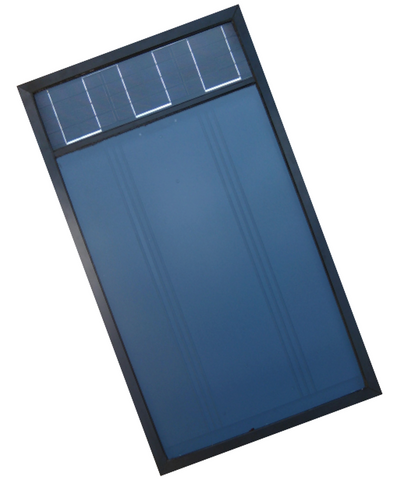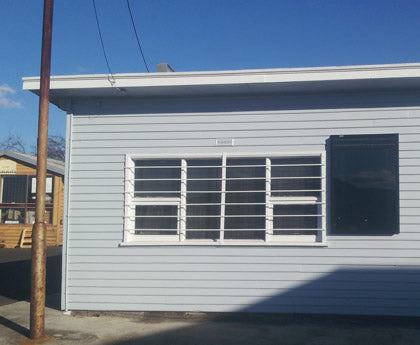Over the last few years, we've sold many solar air heaters to some of our most enthusiastic energy-saving customers.
A solar air heater heats up air and moves this into your home with a small fan.
It's important not to confuse different types of solar panels:
- Solar Air Heater - heats up air.
- Solar Water Heater - heats up water.
- Solar PV (Photovoltaic) Panel - creates electricity.

A picture of the solar air heater we used to sell. The small 'solar PV' panel visible at the top of the solar air heater powered the circulation fan.
Solar air heaters were (and are) an affordable 'zero running cost' heating solution for many of our past customers.
Despite their utility, we've decided to remove solar air heaters from our range, for the following reasons:
1) Solar PV panels are now much cheaper than solar air heaters.
As such, we now recommend using your prime (north facing) roof to solar PV, not solar hot water or solar air heater panels. In other words, you're generally better off installing more PV panels and using an efficient electric heater like one of these in rooms where needed.
2) Solar air heaters do not work at night.
Unlike an efficient hot water tank, solar air heaters do not store any heat for later. They only work during the day. This is a limitation that deterred many potential customers (ie. the fact they usually needed to have another heating system in place anyway).
3) Roof penetrations and ducts are bad for efficiency.
If you don't install a solar air heater carefully you could create heat losses (leaks) which end up working against you at night. You can read more about the importance of draft proofing and insulation in the Your Home Guide Book.
4) Solar heating can be tricky to install.
More importantly, most trades are not familiar with them, so it's not a seamless process to have them installed.
5) Solar air heaters only work well when mounted close to the room they are heating.
This is because the fans are not powerful enough to move the heated air long distances. And the problem is, your coldest rooms are usually far away from where the solar air heater would work best.
6) Solar heaters usually only work in direct sunlight.
Whereas solar PV panels will still produce a percentage of their output in cloudy weather.
Exceptions - Where Solar Heaters May Still Be Worthwhile
There are still a few cases where solar air heaters may be your preferred heating choice. Two examples I can think of are:
- Wall-mounted installations, where you need the extra heat in the adjacent room. This means you're not directly competing with roof space for solar PV. It also minimises the duct losses and simplifies the installation process. On the other hand, you could also install a window in the same space, for a similar heating benefit (and better view).
- Off-grid or seldom-occupied dwellings for the ventilation benefit. Solar air heaters can work well in these locations as they are not connected to mains power and essentially run themselves. A holiday home, for example.
How Do Solar Air Heaters Work?

Graphic of how a well designed Solar Air Heater works.
Solar Powered Heating - Features to Look For
Air flow control - Is air brought in from outside, or re-circulated from inside to maximise the temperature gain?
Self-powered - Is the fan mains powered, or self-powered with an in-built PV panel?
Thermostat control - Can you adjust when the unit switches on and off with a thermostat?

Roof-mounted solar air heater.
Solar Heater - Installation Guide

For best performance, solar air heaters should be installed on an external wall or roof (north or west-facing).
Download an archive copy of our installation manual (PDF).

Wall-mounted solar air heater.
Recommended Energy Efficient Heaters
The most energy-efficient 'heater' is a well-insulated and draft-proofed home that also lets in solar radiation at the right time.
Apart from that (insulation, draft-proofing, and good orientation), we recommend:
- Low power direct heaters like this foot mat heater, heated blankets, and heated throw rugs.
- Small high-star-rated split system air conditioning systems set to an appropriate temperature.
- Other electric heaters when used with a plug-in thermostat.
All of the above-mentioned heaters can be directly or indirectly powered by solar PV panels. The great thing about this approach is that you can effectively zero your energy bills.
Interested in finding out how to zero your energy bills?
Get started right now by purchasing our energy monitors, LED lights, and energy-saving appliances.













